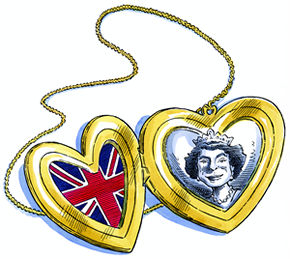- Law & Policy
- Civil Rights & Race
 |
| Illustration by Taylor Jones for the Hoover Digest.
|
I was 12 years old and living in Shrewsbury, Massachusetts, when Queen Elizabeth ascended the throne in 1952. A few months later, in the summer, I went to Britain for the first time with my family and immediately fell in love with the country and its politics. A year later I watched every minute of the queen’s coronation on television—a 12-inch black-and-white set—broadcast many hours after the actual ceremony because film of the event had to be flown across the Atlantic to New York, where it was telecast throughout the United States on every network. In fact, I spent an entire day watching the festivities. I was totally captivated—and so was almost everyone I knew in our small town.
Queen Elizabeth’s coronation was easily the biggest news in Shrewsbury that June. There are strong historical connections between Shrewsbury and Britain. Several families in town are what we called “Mayflower” families—that is, direct descendants of the families that first settled in Shrewsbury during the seventeenth century. Most of them had fled England to find freedom of religion, but by 1952 their descendants had forgotten old animosities and were unabashed Anglophiles. For them Queen Elizabeth represented the beginning of an exciting new era for Britain. The talk was all about Queen Elizabeth II bringing a new golden era to Britain in the tradition of the first Queen Elizabeth, who ruled Britain in the sixteenth century—a time of growing power for her realm.
Admittedly Shrewsbury was especially enthusiastic about all the hoopla surrounding the coronation that year. But the rest of the country was also swept up in the excitement. Compared to this year’s celebration of the queen’s golden jubilee, which attracted an unexpectedly large amount of attention in the United States, my memory of the coronation is that the attention was much greater. The amount of radio and television time is a good measure of the difference: In 1953 the coronation absorbed nearly the whole day, in fact it was two full days because radio brought us the live events one day, and the delayed television coverage filled a second day. Magazines and newspapers covered every moment with front-page stories and pictures.
Why such attention at that time compared to now? Certainly, our relationship with Britain then was much more important to the United States in a number of ways—even taking into account how vital a friend Prime Minister Tony Blair has been to President Bush since September 11. It is also important to remember the proximity of 1952 to World War II. The coronation was only seven years after the war ended, and Britain had been our most important and steadfast ally through thick and thin. Britain had suffered through horrible attacks with unwavering resolve to fight again and again. Winston Churchill was the most towering hero from that time, and by 1951 he was back in Number Ten Downing Street as prime minister. And then there was the Cold War, a new struggle that brought fresh importance to the alliance. Britain was once again our vital and stalwart friend.
Of course there was also the sheer magic of the monarchy. However much we valued our republic and celebrated our independence from Britain, Queen Elizabeth represented splendor, tradition, and majesty that our republic did not have and somehow envied—and still does. All that ceremony and gushing excitement that the British people poured onto their new monarch was totally infectious for Americans. We sat riveted to our early television sets watching the beautiful and radiant new queen being invested with the monarchy in the hallowed setting of Westminster Abbey—a setting we could not reproduce anywhere in our country.
Personally, I still treasure one souvenir from that time: my set of coronation postage stamps, together with all the stamps issued celebrating the queen’s honeymoon cruise around the world visiting parts of Britain’s empire—still substantial at that time.
All of this was very exciting to a boy of 12 growing up in Shrewsbury. From that time to this, Britain and its politics have been a central element of my life and work. The magic is still with me.







